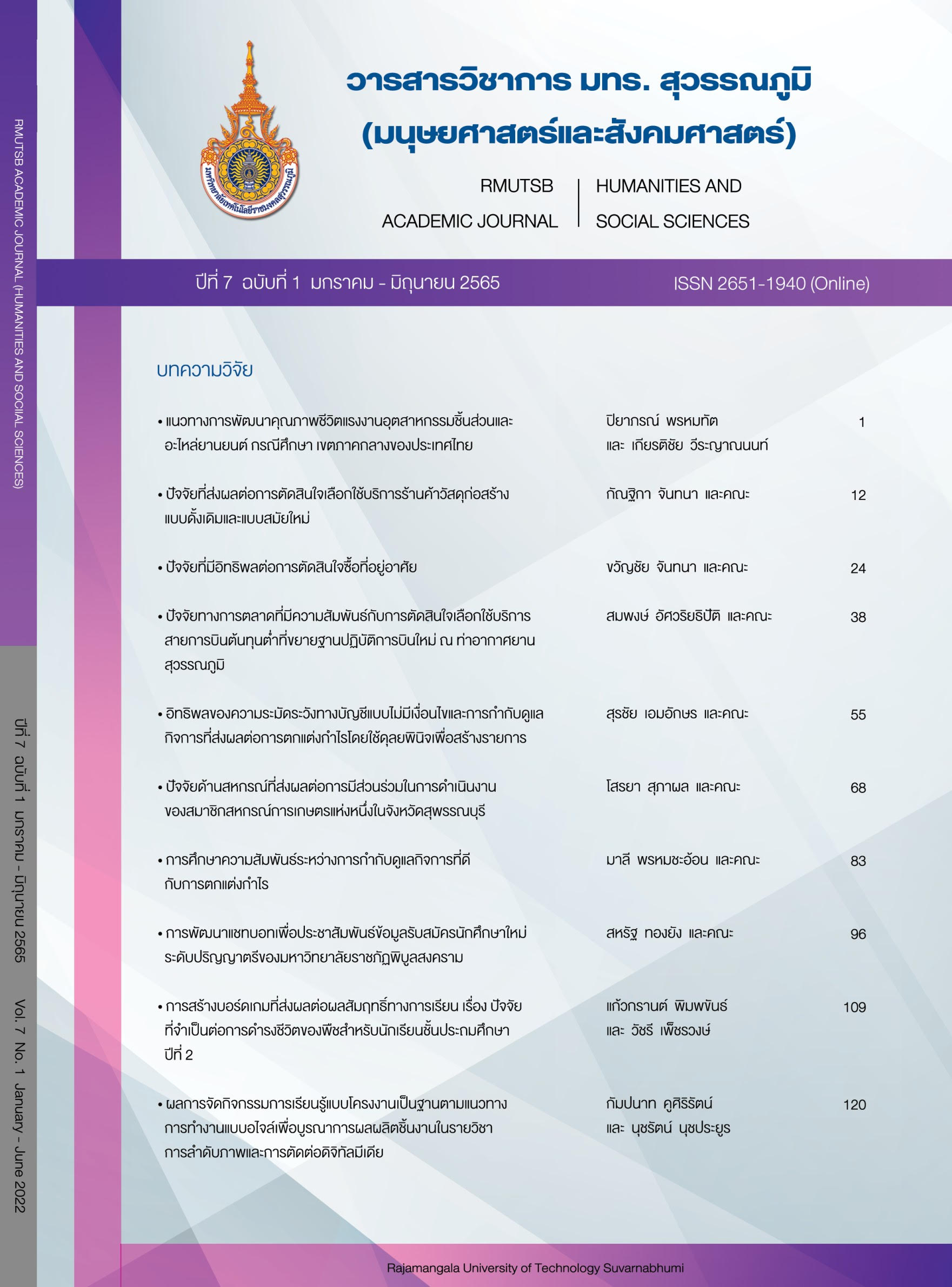The relationship between good corporate governance and earnings management
Main Article Content
Abstract
The objective of this research was to study the relationship between good corporate governance and earnings management. The study considers corporate governance through various characteristics composed of audit committee’s size, proportion of audit committees who have expertise in finance or accounting, proportion of female audit committees, and frequency of audit committee meetings. The decoration of profit is based on the accrual items at the discretion of the management. The data were collected from a database of 452 listed companies in The Stock Exchange of Thailand during 2019, then measured profit decoration according to the Modified Jones Model. The data was analyzed using descriptive statistics and multiple regression analysis.
The results revealed that the female audit committee had a statistical significantly positive relationship at 0.05 level with discretionary accruals. While we observe a positive relationship of other characteristics relationship with earnings management. Moreover, this research will be useful for regulators to use in formulating policies to regulate listed companies in The Stock Exchange of Thailand.
Article Details

This work is licensed under a Creative Commons Attribution-NonCommercial-NoDerivatives 4.0 International License.
References
Baxter, P., & Cotter, J. (2009) Audit committees and earnings quality. Accounting and Finance, 49, 267-290.
Bumrungyat, N., & Sutthachai, S. (2016). A relationship between real activities earnings management and debt covenant maintenance of listed companies in The Stock Exchange of Thailand. NIDA Business Journal, 19, 94-114. (in Thai)
Chamchoy, S. (2015). The effects of initial public offering companies period on earnings management through accruals (research report). Bangkok: Sriphatum University. (in Thai)
Charoenkitjarukorn, P. (2013). Sarbanes-Oxley act and overseas corporate governance for good governance in Thailand. Chulalongkorn Business Review, 35(138), 94-98. (in Thai)
Chaweevanichayakul, K. (2007). Off balance sheet business and its impact on financial reports. Retrieved November 21, 2020, from http://www.oknation.net/blog/print.php?id=22329 (in Thai)
DeAngelo, L. (1986). Accounting numbers as market valuation substitutes. A study of management buyouts of public shareholders. The Accounting Review, 61, 400-420.
Dechow, P., & Dichev, I. (2002). The quality of accruals and earnings: The role of accruals estimation errors. The Accounting Review, 77, 35-59.
Dechow, P., Sloan, R., & Sweeney, A. (1995). Detecting earnings managements. The Accounting Review, 70, 193-225.
Demski, J. S. (2004). Endogenous expectations. The Accounting Review, 79, 229-245.
Ewert, R., & Wagenhofer, A. (2005). Economic effects of tightening accounting standards to restrict earnings management. The Accounting Review, 80, 1101-1124.
Gavious, I., Segev, E., & Yosef, R. (2012). Female directors and earnings management in high-technology firms. Pacific Accounting Review Emerald Article, 24(1), 4-32.
Healy, P. M., & Wahlen, J. M. (1999). A review of the earnings management literature and its implications for standard setting. Accounting Horizons, 13(4), 365-383.
Jones, J. J. (1991). Earnings management during import relief investigations. Journal of Accounting Research, 29(2), 193-228.
Kampanatkoson, K., & Thangrueanrat, C. (2008). Earnings management and leverage ratio. Journal of Accounting Profession, 4(10), 66-78. (in Thai)
Klein, A. (2002). Audit committee, board of director characteristics and earnings management. Journal of Accounting and Economics, 33, 375-400.
McNichols, M. (2002). Discussion of the quality of accruals and earnings. The role of accrual estimation errors. The Accounting Review, 77, 61-69.
McNichols, M. F., & Stubben, S. R. (2008). Does earnings management affect firms’ investment decisions? The Accounting Review, 83(6), 1571-1603.
Phetruen, W. (2018). Earnings management behaviour and related factors. Journal of Business, Economics and Communications Volume, 13(1), 30-31.
Qi, B., & Tian, G. (2012). The impact of audit committees’ personal characteristics on earnings management. evidence from China. The Journal of Applied Business Research, 28(6), 1331-1343.
Thiruvadi, S., & Huang, H. W. (2011). Audit committee gender differences and earnings management. Gender in Management, 26(7), 483-498.
Tummanon, W. (2000). Do you know creative accounting and profit quality? Bangkok: Ionic Intertrade Resources. (in Thai)
Xie, B., Davidson III, W. N., & DaDalt, P. J. (2003). Earnings management and corporate governance: the roles of the board and the audit committee. Journal of Corporate Finance, 9(3), 295-314.


